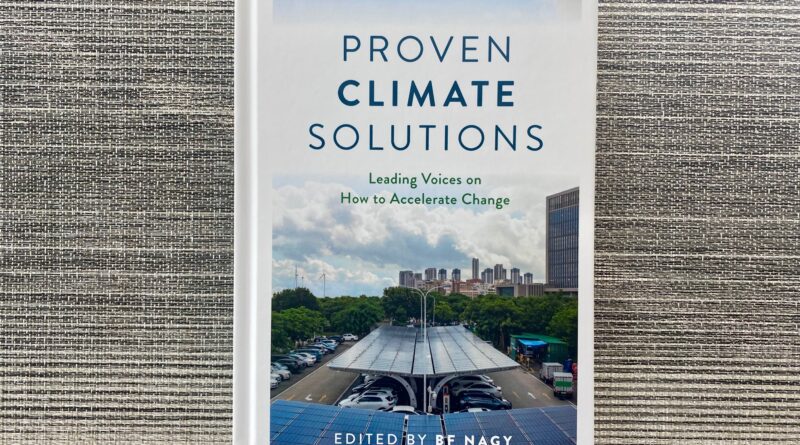Proven Climate Solutions — A New Book On Accelerating Change
A couple of years ago, BF Nagy contacted me, asking if I would be interested in contributing to a book he was assembling. He already had Bill McKibben, Mark Z. Jacobson and others signed up, so how could I disagree? Fast forward two years, and the book, Proven Climate Solutions: Leading Voices on How to Accelerate Change, is out. Sadly, Nagy passed away earlier this year, and so cannot enjoy the final part of his legacy.
Nagy was an author, journalist, speaker, filmmaker, and futurist, making significant contributions to the field of clean energy solutions and climate change. He published more than 160 feature magazine stories and interviewed over 700 experts in the clean energy sector. One of his notable works, The Clean Energy Age: A Guide to Beating Climate Change, provided practical tips and strategies for addressing climate change. The book offered top 10 lists for individuals and organizations to implement clean energy solutions, aiming to help mitigate climate change while saving money. Nagy’s work focused on practical, evidence-based approaches to promoting sustainable solutions, making his contributions valuable resources for policymakers, businesses, and individuals.
Given his prolific writing, it is unsurprising that he contributed multiple chapters to the book in addition to editing it. But there were many contributors.
Mary D. Nichols, a distinguished environmental attorney and policymaker, has made significant contributions to air quality and climate change regulation throughout her career. Serving multiple terms as Chair of the California Air Resources Board (CARB) from 1979 to 1983 and again from 2007 to 2020, Nichols spearheaded pioneering regulations to reduce greenhouse gas emissions, promote electric vehicles, and improve air quality in California. Her tenure at the U.S. Environmental Protection Agency as Assistant Administrator for Air and Radiation during the Clinton Administration further solidified her influence on national air quality standards and climate initiatives. In addition to her regulatory roles, Nichols has taught environmental law at UCLA and actively participated in various environmental advocacy organizations. Nichols contributed the foreword, framing the need for speed of transformation with a personal story of her childhood experiences with nature and the outdoors.
Mark Z. Jacobson is a professor of civil and environmental engineering at Stanford University and the director of its Atmosphere/Energy Program, known best for his 100% Renewables By 2050 series of publications, now covering 145 countries. Jacobson’s chapter deals with the incredible speed with which a 100% renewables future would pay for itself, a mere six years. That’s because there will be a roughly $11 trillion annual cost savings, crossing climate impacts, human health impacts and the sheer expense of spending 11% of global energy just to extract, process, refine, and distribute fossil fuels.
Dr. Audrey Lee serves as the Senior Director of Energy Strategy at Microsoft, where she leads global regulatory policy, technology, resilience, and commercial strategy for the company’s datacenter energy team. Laura Fedoruk is a data scientist and sustainability professional currently working at X, the moonshot factory. With a background in engineering and data science, she focuses on developing innovative solutions to accelerate positive outcomes for people and the planet, particularly in the realm of clean energy and climate change mitigation. Steve Wheat is currently the VP of program management at Swell Energy after years at Sunrun, where he worked with Lee and Fedoruk. They contributed a chapter on virtual power plants, central to their pioneering efforts at Sunrun.
Dr. Robert W. Howarth is a distinguished biogeochemist and environmental scientist, renowned for his expertise in methane emissions and climate change. He holds the position of David R. Atkinson Professor of Ecology and Environmental Biology at Cornell University. With a robust academic background, including a Ph.D. from MIT and the Woods Hole Oceanographic Institution, Howarth has significantly contributed to understanding the environmental impacts of human activities on sulfur, nitrogen, phosphorus, and methane cycles. His groundbreaking research on the methane emissions from the natural gas industry has influenced global climate policy, and he contributes a chapter on why fossil gas is a false solution, serving only the gas industry itself.
Dr. Nancy E. Ryan is a Partner at eMobility Advisors, where she brings over 25 years of experience in the electricity industry. Her expertise spans across high-level government, corporate, and nonprofit sectors, focusing on strategic advice, economic analysis, and the development of innovative public policies and regulations to promote transportation electrification and renewable energy. Dr. Ryan previously served as a Commissioner at the California Public Utilities Commission, where she played a pivotal role in formulating the nation’s first transportation electrification policies. She contributed a chapter on policy and planning for electric vehicle grid integration.
Professor Jeff Dahn, a renowned Canadian scientist and professor at Dalhousie University, has made significant strides in lithium-ion battery technology. His pioneering research has focused on enhancing battery longevity, energy density, and safety, positioning him as a leading figure in the field. In 2016, Dahn entered a pivotal research partnership with Tesla, Inc., aiming to develop next-generation battery cells for electric vehicles and energy storage. With over 700 scientific papers and numerous patents to his name, Dahn’s contributions have profoundly impacted the advancement of efficient and durable batteries, crucial for the future of electric transportation and renewable energy. He collaborated with Nagy on a chapter about energy storage, with a focus on the scale of the requirement and where different battery technologies will play.
Kate Gaertner is a leading expert in corporate sustainability and circularity, bringing over 25 years of combined corporate and entrepreneurial experience to her work. She is the founder and CEO of TripleWin Advisory, a sustainability consultancy that helps businesses develop circular business models and implement positive environmental and social changes. Her contribution was all about food, the challenges with our waste of it, the solutions to its carbon footprint, and innovative ways we’ll bring food production closer to cities in the future.
Bill McKibben is an influential environmentalist, author, and activist, renowned for his pioneering work in climate change advocacy. As the author of “The End of Nature,” one of the first books on climate change for a general audience, and the co-founder of 350.org, he has significantly raised awareness and mobilized global action against climate change. He writes, compellingly as always, about our need to stop burning things and the reality that we have the technologies that make that possible in hand.
Dr. Luxmy Begum is an environmental engineer with over 20 years of experience in the environmental and renewable energy sectors. She holds a Ph.D. in Environmental Engineering from the University of Tokyo and is the founder of The EcoAmbassador, promoting sustainable practices. Dr. Begum has authored several books on environmental issues and specializes in advanced water and wastewater treatment technologies. Unsurprisingly, she contributed a chapter on how to deal with our water demand more sustainably and efficiently.
Dr. David Barnes is a marine ecologist at the British Antarctic Survey (BAS) with over 26 years of experience studying polar marine ecosystems. Specializing in benthic ecology, he has conducted extensive research on the macro- and megabenthic responses to environmental changes in West Antarctica. Polar biodiversity and climate is the subject of his contribution.
And, of course, there’s me. I’m honored and humbled to be among this field of luminaries. Overlapping with a global career in complex technological transformation that had me in systems engineering and leadership roles in North America, South America, and Asia, I’ve spent the past fifteen years trying to figure out what climate solutions will actually work and be implemented at scale. I assess and quantify the scale of the problem area, then look at virtually all purported solutions. I use the trifecta of technical viability, economic competitive, and human acceptability to figure out which levers will dominate. I project scenarios decade by decade out through 2100, often heterodox as I don’t have any requirement to satisfy the needs of stakeholders within those domains. I’ve left a lot of articles behind me as my process includes writing my findings down to solidify them for myself and potentially assist others. After some back and forth, Nagy settled on my projection of aviation decarbonization through 2100, something that first appeared in CleanTechnica in 2021, although I’ve updated it a couple of times since then.
The book, now available from Roman & Littlefield and Amazon on multiple continents in both Kindle and hardcover formats, is worth picking up. As one reviewer said, “… this volume represents the triple crown of publishing. One of those remarkable books that is incredibly readable, relatively comprehensive, and usable for novice and expert alike.”
Note: I contributed to this pro bono and am receiving no proceeds from sale of the book.
Have a tip for CleanTechnica? Want to advertise? Want to suggest a guest for our CleanTech Talk podcast? Contact us here.
Latest CleanTechnica.TV Videos

CleanTechnica uses affiliate links. See our policy here.

